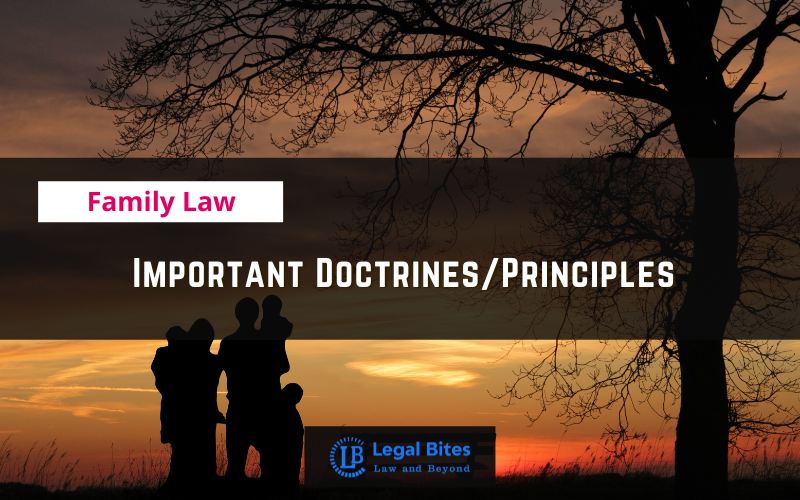Important Doctrines/Principles under Family Law
Read important Doctrines/Principles under Family Law’ only on Legal Bites.

This article titled ‘Important Doctrines/Principles under Family Law’ deals with various important doctrines and principles used in Family law along with brief descriptions. Important Doctrines/Principles under Family Law 1. Factum Valet The factum valet means the act which should not be done is valid when it is done. The hundreds of text do not deny the fact. This doctrine is applicable when there is an obligation and not a legal prohibition for a thing. 2. Principle of...
This article titled ‘Important Doctrines/Principles under Family Law’ deals with various important doctrines and principles used in Family law along with brief descriptions.
Important Doctrines/Principles under Family Law
1. Factum Valet
The factum valet means the act which should not be done is valid when it is done. The hundreds of text do not deny the fact. This doctrine is applicable when there is an obligation and not a legal prohibition for a thing.
2. Principle of Notional Partition
This is a deemed partition wherein it is presumed by law that a coparcener died as a divided member of the joint family.
3. Khayar-ul-Bulugh or Option of Puberty
A minor cannot legally enter into a marriage contract nor is the contract of marriage entered into by a guardian on his or her behalf, always binding on the minor. The minor on attaining puberty may ratify or revoke such a contract if he or she chooses. This right is called Khayar-ul-Bulugh (the option of puberty)
4. Principle of Relation Back
The doctrine of relation back under old Hindu Law states that if a Hindu widow adopts a son after the death of his husband then the adopted son will be deemed to have been adopted on the death of the husband. The theory is against the rule that a property once vested cannot be divested.
5. Principle of Survivorship
The Doctrine of Survivorship dictates that the shares of the coparceners of a property are varied and subject to change with respect to deaths and birth in the family. With a death in the family, the coparcenary property increases and with a birth in the family, the coparcenary property decreases.
6. Coparcenary Property
Coparcenary is a term used in matters related to Hindu Succession Law. It refers to a person who has the capacity to assume a legal right in his ancestral property by birth. It means ‘unity of title, possession and interest’
7. Principle of Testamentary and Intestate Succession
Testamentary succession refers to succession by way of will; and non-testamentary succession refers to succession otherwise than by will, when a person dies without making a will.
8. Doctrine of Aul under Muslim Law
When in case, the total sum of the specific shares allotted to various shares exceeds the unity then the doctrine of increase (Aul) comes into the application. In this doctrine, the specific share of each sharer is reduced in a proportionate manner.
9. Doctrine of Radd under Muslim Law
After distributing the property of the deceased amongst the Sharers, but there is no heir of the deceased falling under the category of Residuary, the residue of the property reverts back to the Sharers in the proportion of their shares.
10. Acknowledgment or IKRAS under Muslim Law
Muslim law recognizes the institution of ‘IKRAS’ (acknowledgment) where the paternity of a child, which means his legitimate decent from his father, cannot be proved by establishing marriage between his parents at the time of conception of birth.
11. Principle of Nikkah Halala
This is an age-old tradition practiced in Islam that empowers a Muslim man to divorce his wife by revocable talaq and remarry the same woman twice. After he divorces his wife for two times she is considered haram (unlawful) and in order for the wife to be lawful again, she has to marry another man and have sexual intercourse with him. After ending the marriage which can be through divorce or the death of the husband she becomes lawful and can remarry her first husband.
12. Principle of Iddat Period
In Islam, iddah or iddat is the period a woman must observe after the death of her husband or after a divorce, during which she may not marry another man. One of its main purposes is to remove any doubt as to the paternity of a child born after the divorce or death of the prior husband.
13. Doctrine of blending
The concept of blending the self-acquired property of the coparcener of a joint Hindu family with his self-acquired property or throwing it into a common stock of the HUF is an established doctrine of Hindu Law, duly recognized by Courts in a number of cases.
14. Doctrine of detriment
15. The doctrine of cypress
The cypres doctrine means “as near as possible” – practically. The cypres doctrine applied to all transfers other than testamentary where a general charitable intention could be found to exist.
16. Doctrine of ‘Patria Potestas
The father may cause severance of sons even without their consent. It is the remnant of the ancient doctrine of ‘Patria Potestas’. The father during his lifetime is competent to effect such partition under Hindu law and it would be binding on his sons.

Paras Ahuja
Paras Ahuja is a law graduate from National Law University, Jodhpur (2022). She has graduated with Constitutional Law Honours and takes a specific interest in gender laws and labour laws.
